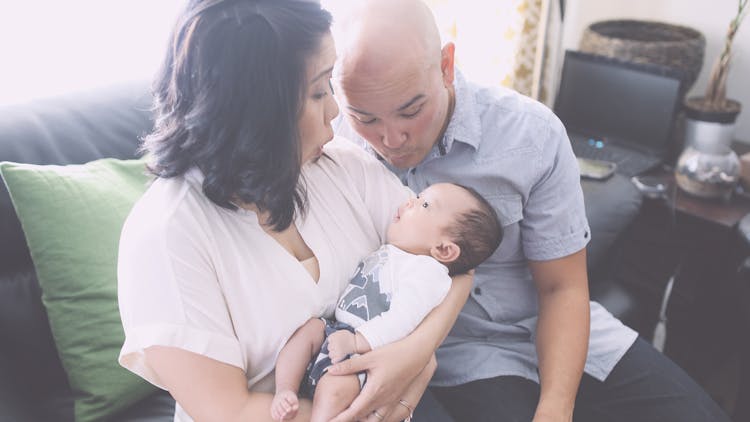Pastor Joakim Lundqvist is the Lead Pastor of Word of Life Church in Sweden, which has more than 600 international network churches. In a message he shared with Life.Church, he talked about his passion for all generations coming together to reflect God’s diverse kingdom. So we sat down to talk to him on the You’ve Heard It Said podcast to learn more about intergenerational relationships. Below are some highlights of what he shared, or you can find the whole interview here and use it to start a conversation with your friends, family, and LifeGroup.
How have intergenerational relationships played out in your life? Were there people older or younger than you who gave you this passion for multigenerational collaboration?
Pastor Joakim: I did have a grandfather who loved the Lord. I remember when I was 14, he wrote me a letter. He just said, “Whatever you do with your life and your future, just follow Jesus.” I really didn’t want to, and I was actually running away from God at the time. I remember how those words had an impact—I locked myself in my room, and I read the letter, and I cried.
And then I came to accept Jesus when I was 16. I led a whole lot of my friends—basically everyone—to the Lord within a year. All of a sudden, even though I was new in my faith, I was the oldest one in my faith at the same time. So I had to take on the role of a youth pastor when I was 18.
I’ve been working with young people for over 25 years. And as you do, you get the passion for young people but also you see the need for generations to connect and the importance of the Kingdom of God displaying not only one generation but all generations.
We should be that city on a hill reflecting God’s Kingdom, and God’s Kingdom is multigenerational. It’s diverse in every sense of the word. So that’s really been important to me throughout my life.
Have there been any stereotypes that you’ve had to overcome in building relationships with younger people or older people? How did you get past those and form the relationships anyway?
Pastor Joakim: For me, the last verse in the Old Testament has always been key. Malachi 4:6 says:
“He will turn the hearts of the parents to their children, and the hearts of the children to their parents; or else I will come and strike the land with total destruction.” Malachi 4:6 NIV
First of all, it says, “the hearts of the parents to their children,” meaning, in some ways, it’s the responsibility primarily of the older generation. It starts with their initiative—it starts with them bowing down to the younger generation—not waiting for the younger generation to step up. I tell my church that if you are 20 years old or more, you should already be looking behind you to see if there is someone younger than you that you can help, pray for, support, and encourage.
That verse also says, “He will turn the heart.” The younger generation will not need new friends, so you don’t have to pretend that you’re younger than you are—in fact, please don’t.
The need for this younger generation is not primarily a new friend but rather a father figure or a mother figure. And sometimes I think people in my generation might be feeling the pressure of not really understanding the next generation, so they’re hesitant to get involved.
But you have experience. You’ve walked a few steps further, and I do believe that that’s the point of connection.
You mentioned that God is a multigenerational God. Can you tell us more about that?
Pastor Joakim: I’m fascinated that God in the Old Testament introduces Himself as the God of Abraham, Isaac, and Jacob. So in His name alone there are three generations. If you look at it all through the Bible, you had people who were not physical parents mentoring spiritual sons and daughters.
You had Moses who took Joshua into the tabernacle of revelation. Joshua wasn’t his son, but Moses still took responsibility for him and provided spiritual mentorship. We have Samuel—in relation to King David—who also wasn’t David’s physical father, but he took a spiritual responsibility for him.
You have all these people who were not really connected by blood, and still it was natural for them to have a basic understanding of their own responsibility to make use of whatever they had experienced—good or bad—to pass on to the next generation.
You said, “Take what you have and use it to invest in somebody else.” What encouragement would you give to someone who thinks they don’t have anything to offer?
Pastor Joakim: You have so much to offer, and sometimes we make it too complicated. When we speak about generations and God’s perspective, my favorite story in the Bible is the story of Mary and Elizabeth.
After her visit from the angel, Mary goes to visit Elizabeth, who was an older relative. I love the fact that when these two generations meet, the Spirit of God falls upon both of them.
So it’s not only the younger generation that needs the older generation—we need each other. It doesn’t say that Elizabeth had a lot of skills, but she just offered a bit of experience that Mary didn’t have.
What’s something you’ve learned from having people in your life who are younger than you?
Pastor Joakim: I’ve learned so much! Three years ago, the Lord challenged me. He said, “I want you to spend 40 percent of your time with people half your age.”
It took a lot of change in my schedule, but it’s been so beneficial. I love that every time I’m around young people, they refuel my energy. They help me open my eyes to areas that I don’t see.
So it’s not just me teaching them, it’s me asking them, “How can our church be a better church for your generation?” And the input I get is so much better than any idea I would have come up with myself.
What’s something that you’ve learned from having relationships with people older than you?
Pastor Joakim: When you’re young, you think you’re invincible. For me, I have two mentors who are both in their 80s and have been in ministry for decades. I call them all the time, and they have full access to me, to my struggles, to what I go through, to whatever challenge I may face. And to me, that’s such an amazing protection—especially when you end up in a position where you don’t really know what to do.
It’s so easy to act in pride or think, “I’m going to fix this myself,” instead of learning from the experiences of others. I believe that’s all part of the generational connection. I want to learn from the experience of men and women of God who have gone further than I have—not to use that source of wisdom would just be pride.
Why do you think it’s so important for the church to value intergenerational relationships, and what do you think could happen if we start valuing them?
Pastor Joakim: The church is a reflection of God’s Kingdom, and if the church has only one generation, we do not project the diversity of that kingdom. The church is called to be a city on a hill. We’re called to be the light of the world. We’re called to be the reflection of God’s values—God’s Kingdom.
I do believe that as a statement to the world we need to be the ones saying this is what God is like. When you move into God’s family, you move into another Kingdom and another culture. And in that culture, the multigenerational aspect is so incredibly important.
What advice would you give to somebody who’s wondering, “How do I form these relationships?”
Pastor Joakim: Whatever you do in life, there will be some young person who will want to learn from you. Just make yourself available and start where you are. It’s really just about seeing the people who are already there, and maybe it can grow from there.
As the Body of Christ, we are called to represent the Kingdom of God on earth. When we invite people from different generations into our lives, we are blessed with new perspectives and ideas. So today, ask God to reveal someone in another generation who you could invest in or learn from. Then, take that first step to start the relationship.


